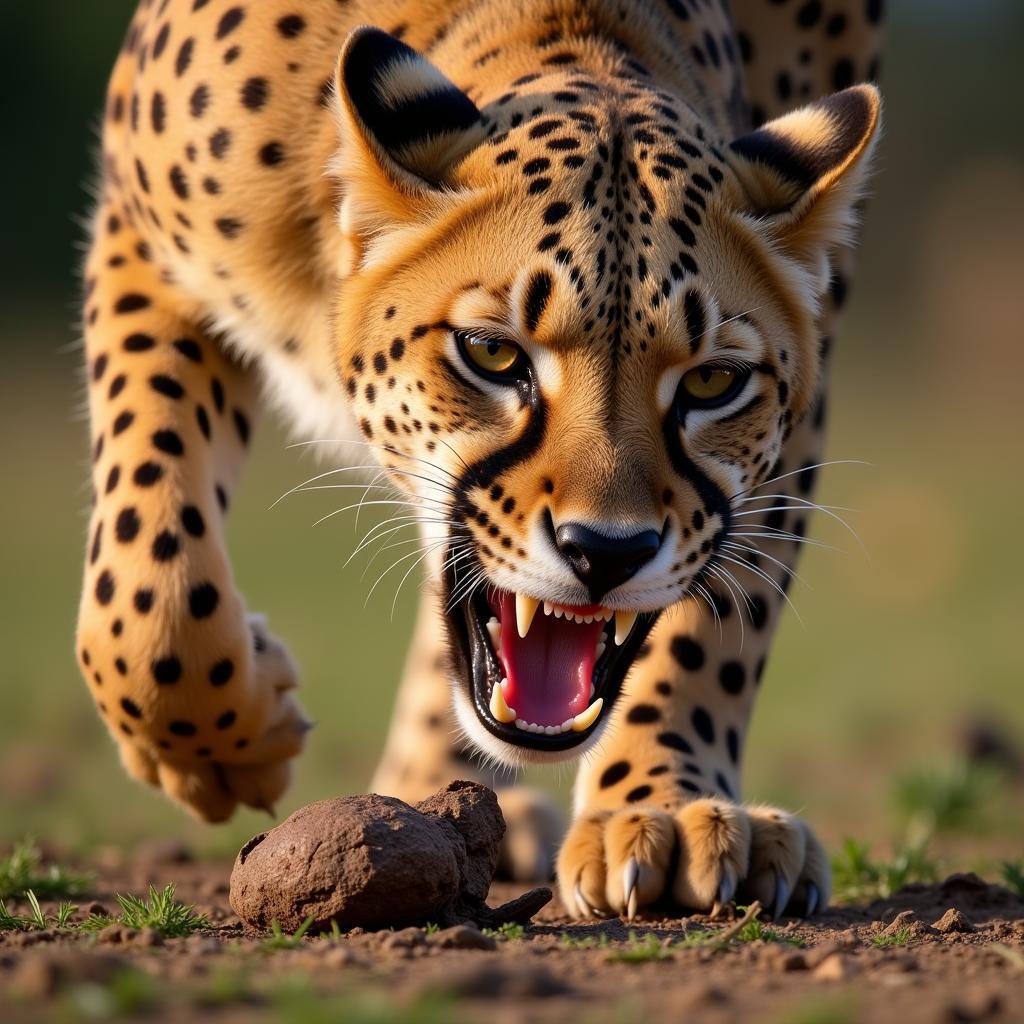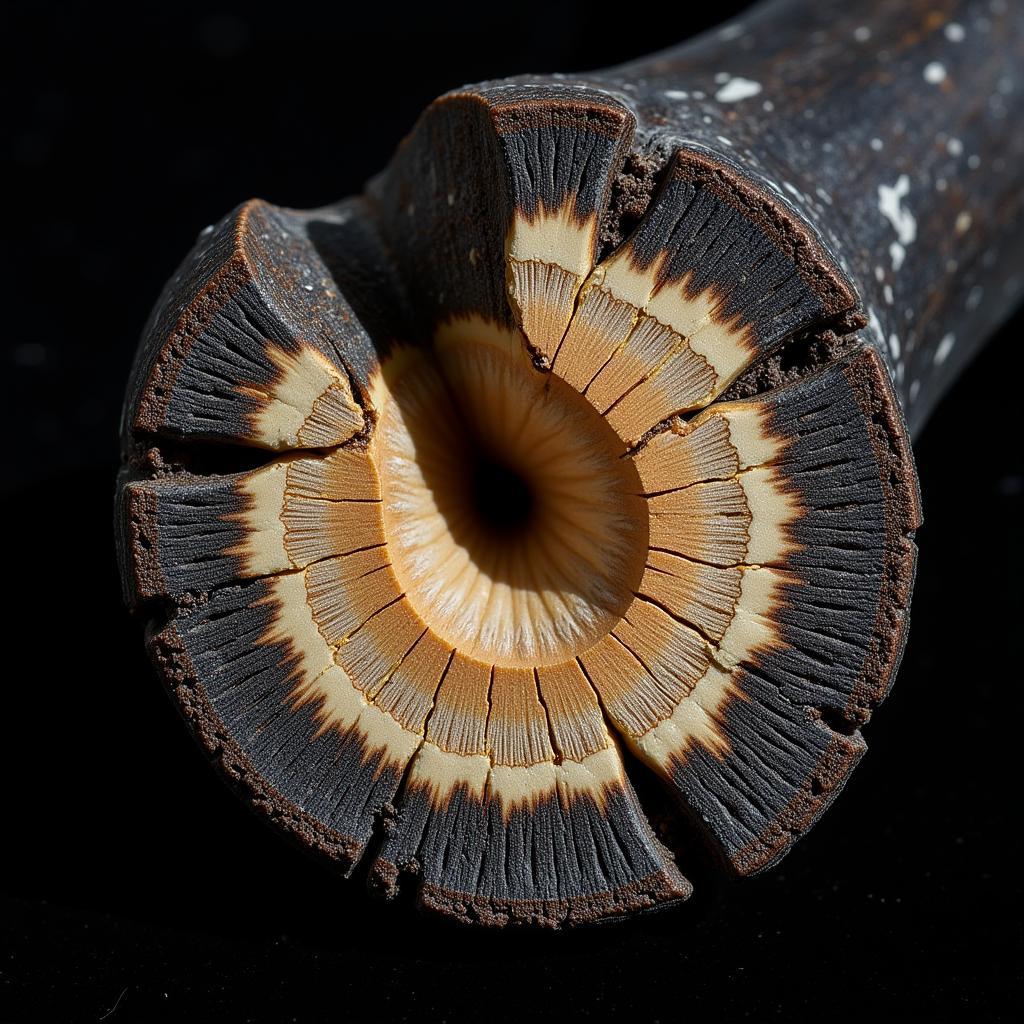Unveiling the Mysteries of the African Crocodile Mask
African Crocodile Masks hold a significant place in the rich tapestry of African art and culture. These intricate carvings, imbued with symbolism and power, represent much more than just a reptile. They embody spiritual beliefs, social structures, and the deep connection between humans and the natural world. Let’s delve into the fascinating world of the African crocodile mask and uncover the stories they tell.
Check out some examples of African folk art animals. african folk art animals
The Significance of the Crocodile in African Culture
The crocodile, a powerful predator inhabiting the rivers and lakes of Africa, is often viewed with both awe and reverence. In many cultures, it is considered a sacred animal, representing strength, fertility, and protection. It is believed to be a link between the physical and spiritual worlds, capable of mediating between humans and the divine. This reverence translates into the creation of intricate crocodile masks, used in various rituals and ceremonies.
Symbolism and Meaning
African crocodile masks are imbued with a wealth of symbolic meaning. They represent different aspects of life, including:
- Power and Authority: The crocodile’s strength and dominance are often associated with leadership and social status. Masks depicting the crocodile are often worn by chiefs, elders, and other figures of authority.
- Fertility and Abundance: The crocodile’s connection to water, the source of life, links it to fertility and abundance. Masks are sometimes used in ceremonies related to agriculture and the cycles of nature.
- Protection and Guardianship: The crocodile’s tough hide and fierce nature are seen as symbols of protection. Masks are believed to ward off evil spirits and provide safety to the wearer.
- Transformation and Renewal: The crocodile’s ability to shed its skin is linked to themes of transformation, rebirth, and renewal.
Where are African Crocodile Masks Used?
African crocodile masks are predominantly used in ceremonial dances and rituals, particularly those related to:
- Initiation Rites: Young men undergoing initiation into adulthood may wear crocodile masks to symbolize their transition into a new phase of life.
- Ancestor Worship: Crocodiles are sometimes seen as intermediaries between the living and the dead. Masks are used in ceremonies honoring ancestors and seeking their guidance.
- Agricultural Festivals: Masks are worn during festivals celebrating harvests and ensuring the continued fertility of the land.
- Healing and Divination: In some cultures, crocodile masks are used by healers and diviners to connect with the spiritual world and perform rituals.
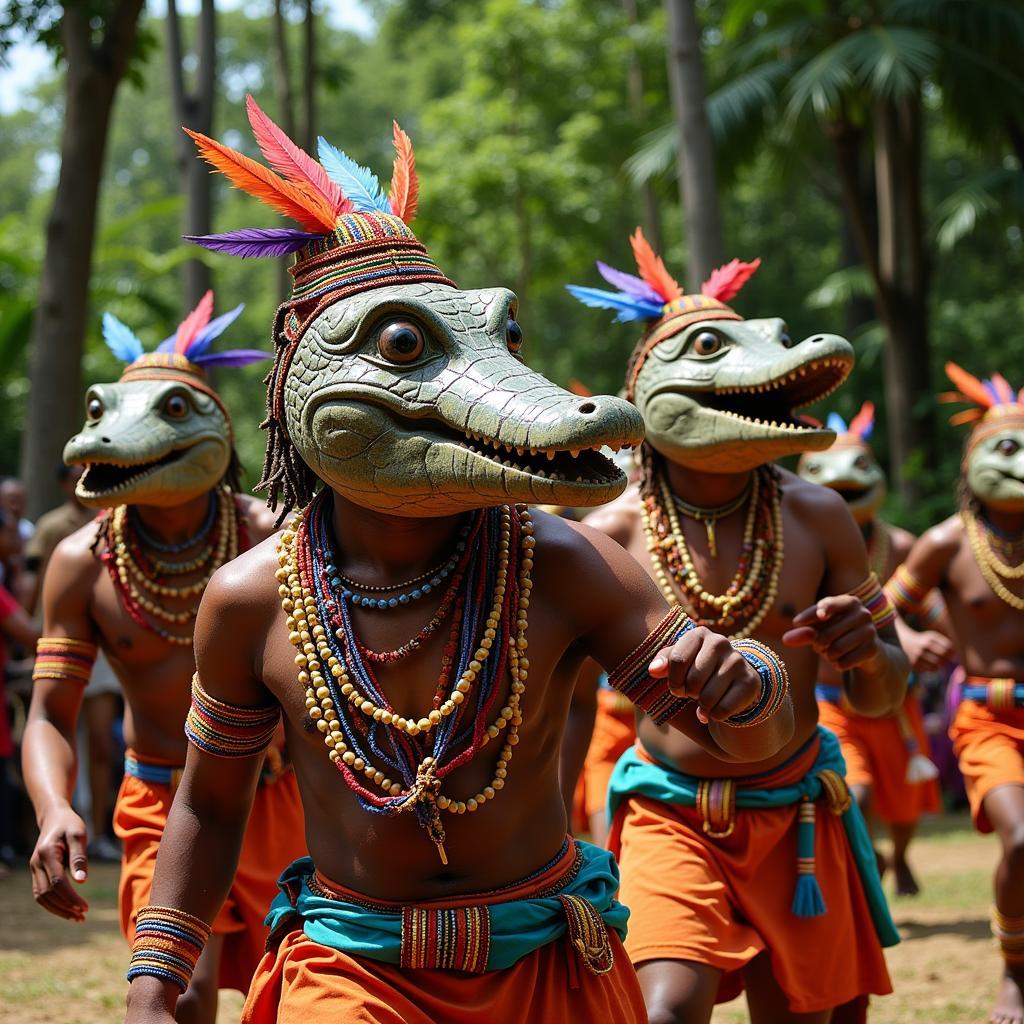 African Crocodile Mask Used in Ceremonial Dance
African Crocodile Mask Used in Ceremonial Dance
Crafting the Mask: Materials and Techniques
The creation of an African crocodile mask is a skilled art form, passed down through generations. Various materials are used, depending on the region and the specific cultural traditions. Common materials include:
- Wood: The most common material, chosen for its durability and ease of carving.
- Leather: Used to add texture and detail, particularly for the crocodile’s scales.
- Fiber: Plant fibers can be woven or braided to create intricate patterns and decorations.
- Shells and Beads: Used to embellish the mask and add symbolic meaning.
- Pigments and Dyes: Natural dyes derived from plants and minerals are used to create vibrant colors.
The carving process often involves specialized tools and techniques, requiring great skill and precision.
What materials are African crocodile masks made of? They are often crafted from wood, leather, fiber, shells, beads, and pigments.
Regional Variations in Style
African crocodile masks exhibit a diverse range of styles, reflecting the unique artistic traditions of different regions and ethnic groups.
- West Africa: Masks from West Africa, particularly from Mali and Burkina Faso, often feature elongated snouts and stylized representations of the crocodile’s teeth.
- Central Africa: Masks from Central Africa tend to be more abstract and geometric in form.
- Southern Africa: In Southern Africa, crocodile masks are less common, but they still hold symbolic importance in some cultures.
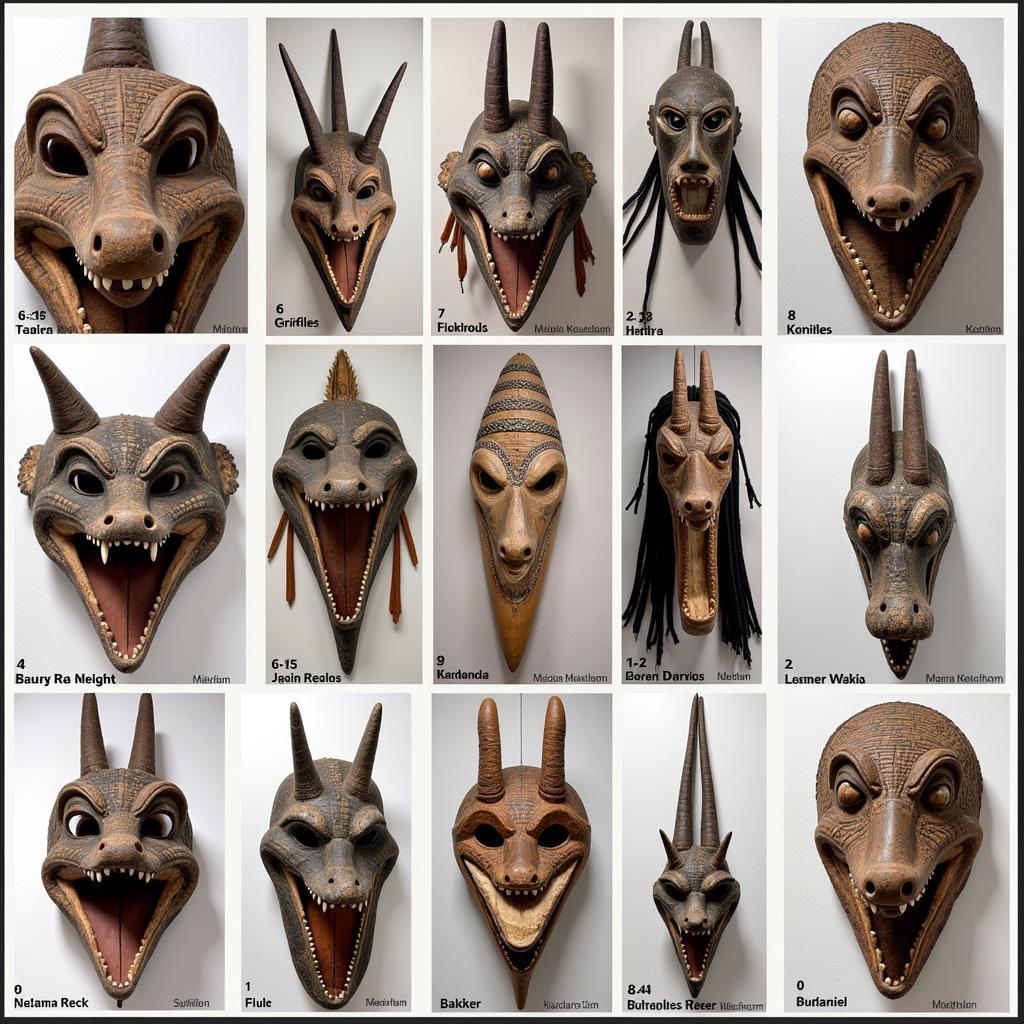 Regional Variations in African Crocodile Masks
Regional Variations in African Crocodile Masks
african animal crafts have deep cultural significance.
Dr. Abena Osei, a renowned anthropologist specializing in African art, explains, “Crocodile masks are not mere artifacts. They are living embodiments of cultural beliefs and traditions, connecting people to their ancestors and the natural world.”
African Crocodile Masks in the Modern World
Today, African crocodile masks continue to hold cultural significance, though their use has evolved. They are still used in traditional ceremonies and rituals, preserving ancient practices. However, they have also gained recognition as valuable art objects, collected and appreciated by art enthusiasts worldwide.
Preserving Cultural Heritage
The continued creation and use of African crocodile masks play a crucial role in preserving cultural heritage. By passing down the skills and traditions of mask-making, communities ensure that their cultural identity remains vibrant and alive.
Why are African crocodile masks important? They are vital for preserving cultural heritage and connecting people to their ancestors and the natural world.
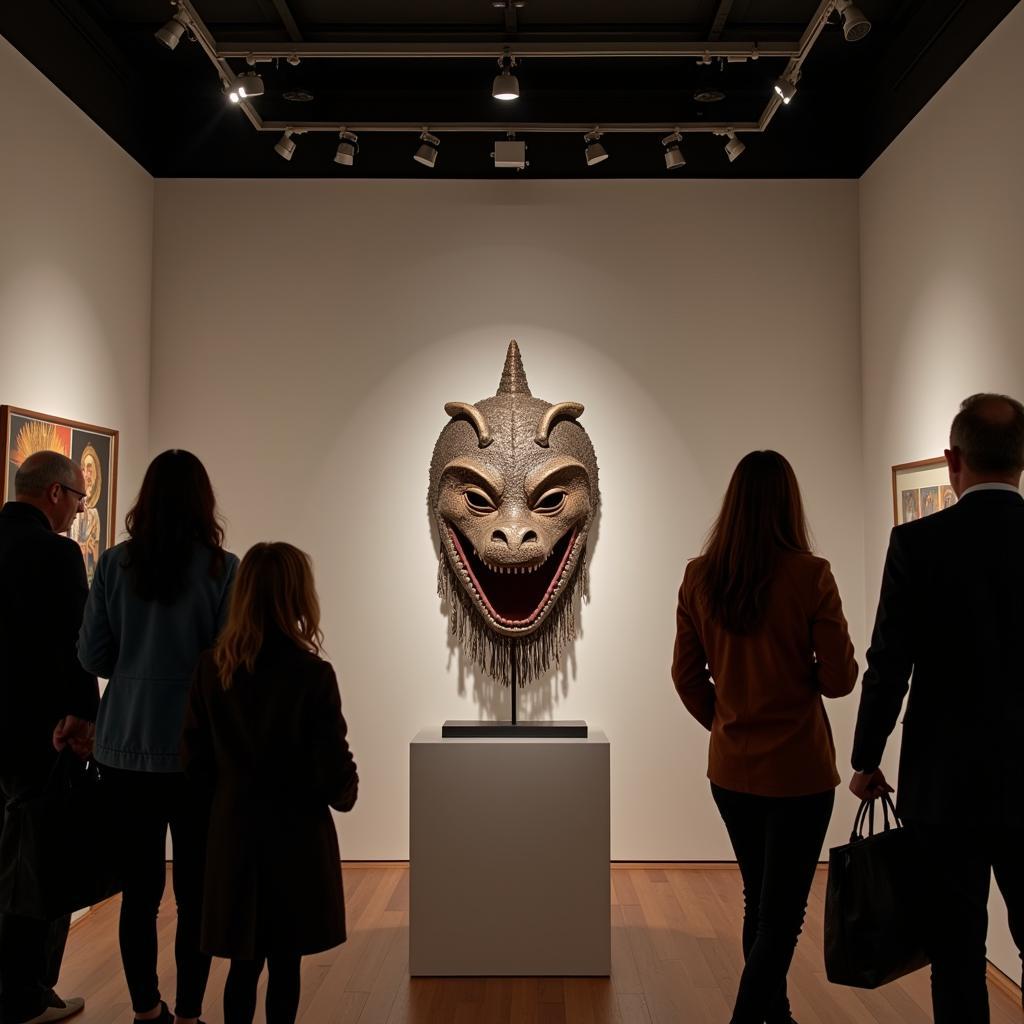 African Crocodile Mask in Modern Art
African Crocodile Mask in Modern Art
african killer and african fighter decals showcase different facets of the continent. african animal activities preschool can also help younger generations appreciate these traditions.
Chief Kwame Asante, a respected elder from Ghana, shares his perspective, “Our masks are more than just beautiful objects. They are the stories of our people, passed down through generations. They are our history, our identity.”
In conclusion, the African crocodile mask is a powerful symbol of the continent’s rich cultural heritage. These intricate carvings embody spiritual beliefs, social structures, and the profound connection between humans and the natural world. By understanding the significance of these masks, we gain a deeper appreciation for the diverse cultures of Africa and the enduring power of art to connect us to the past and inspire us for the future.
FAQ
- What do crocodile masks symbolize? Crocodile masks symbolize power, fertility, protection, and transformation.
- What are crocodile masks made of? They are typically made of wood, but also incorporate materials like leather, fiber, shells, and beads.
- Where are crocodile masks used? They are used in various ceremonies, including initiations, ancestor worship, and agricultural festivals.
- How are crocodile masks made? They are carved using traditional tools and techniques, often passed down through generations.
- What is the cultural significance of crocodile masks? They are vital for preserving cultural heritage and connecting people to their ancestors and the natural world.
- Are crocodile masks still used today? Yes, both in traditional ceremonies and as appreciated art objects.
- Where can I learn more about African masks? Museums, cultural centers, and online resources offer valuable information.
Do you have any other questions? Check out other articles on our website about African arts and culture.
When you need assistance, please contact us: Phone: +255768904061, Email: [email protected] or visit us at Mbarali DC Mawindi, Kangaga, Tanzania. We have a 24/7 customer service team.
